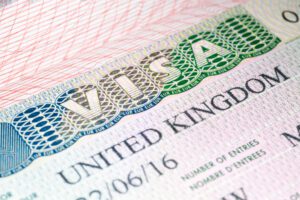As an entrepreneur considering your immigration options to the UK, you’ve probably heard about the Self-Sponsorship route.
This route is rapidly gaining recognition among business-minded individuals who aim for independence and flexibility in the immigration process.
In this article, immigration experts from Gulbenkian Andonian Solicitors in London outline everything you need to understand about obtaining UK residency through the self-sponsorship route.
What is the Self-Sponsorship Visa?
The Self-Sponsorship route is an immigration strategy for entrepreneurs aiming to establish themselves in the UK by leveraging the existing Skilled Worker Visa framework. Instead of relying on employment offers from UK-based companies, you set up your own UK entity and apply for a sponsor licence under the Skilled Worker Visa scheme. This enables you to issue yourself a valid Certificate of Sponsorship (CoS) to support your UK visa application.
What are the Requirements for Self-Sponsorship in the UK?
If you want to apply for a UK Self Sponsorship Visa, you must first meet some criteria. To be more specific, applicants need to satisfy standard Skilled Worker Visa requirements, which include:
English Language Requirement
You must demonstrate your English language ability through either an approved English language test (IELTS, Pearson, etc.) or provide documentation showing you have an academic qualification taught in English.
Maintenance Funds
You’ll be required to show sufficient maintenance funds to support yourself initially. Typically, the UK government requests evidence of having at least £1,270 held continuously for 28 days prior to application.
Salary Threshold
Your sponsoring company (your own UK business) must pay you a minimum annual salary, usually £38,700 or the prevailing market rate for your job role, whichever is higher.
Business Viability
Your UK business must demonstrate genuine viability. This includes having a realistic business plan that illustrates potential market success, profitability, and the capability to financially support your Skilled Worker Visa.
Step-by-Step Guide to the Self-Sponsorship Visa Process
Essentially, self-sponsorship involves setting up your own UK-based company to sponsor yourself legally through a Skilled Worker Visa. Here are more details about each step:
Step 1: Register a UK Company
The first important step towards self-sponsorship is formally setting up a UK company. Here is how you can do this effectively:
Decide on a Legal Structure
Typically, entrepreneurs select a Limited Company (Ltd) structure, providing clear legal protection, credibility, and a straightforward ownership model. Registering as a limited company allows you to hold shares in the business, simplifying your ownership and control.
Registering with Companies House
Register your company with Companies House, the UK’s official business registrar. You will need:
A distinctive business name that meets UK company naming rules.
A physical office location based in the UK, used as your official company address.
A minimum of one company director, this can be you.
The registration process is straightforward, often completed online, with approval usually received within 24–48 hours. Once registered, you’ll receive a certificate of incorporation, confirming your business legally exists.
Open a Business Bank Account
A UK business bank account is important to demonstrate your business’s financial activities clearly. Most UK banks require proof of address, your company registration documents, identification of directors, and a business plan.
Step 2: Apply for a Sponsor Licence
A sponsor licence permits your business to sponsor non-UK workers, including yourself.
To secure a sponsor licence, your company must:
Be officially incorporated as a recognised business entity within the UK.
Operate lawfully and actively trade or intend to trade genuinely.
Demonstrate robust HR systems and compliance management (such as appropriate record-keeping, monitoring employee immigration status, and reporting relevant changes to UKVI).
You’ll need to submit several key documents during the application process, typically including:
Certificate of incorporation
Business bank statements
Proof of the company’s UK trading presence (e.g. leases, contracts, VAT registration)
Detailed business plan and cash flow projections
Proof of having key personnel to manage sponsorship duties (usually yourself or a trusted professional representative)
Sponsor licence applications usually take about 8 weeks for standard service processing. There is a priority service available for a quicker turnaround of around 10 working days, but slots for priority service are limited and highly competitive.
Careful preparation, attention to detail, and ideally professional immigration solicitor support can significantly reduce these risks and ensure smooth licence approval.
Step 3: Allocate a Certificate of Sponsorship (CoS)
Upon successful sponsor licence approval, your company can now issue you a Certificate of Sponsorship. The CoS is an essential electronic document confirming your role, salary, and employment conditions with your UK company.
Issuing Your CoS
To assign a CoS, you’ll use the Sponsor Management System (SMS) provided by UKVI upon licence approval. The CoS must specify key details, including:
Job title and occupation code matching the official UK government codes
Salary information meeting Skilled Worker Visa thresholds
Employment duration (initially up to 5 years, renewable afterward)
Confirmation that the job meets skilled worker eligibility criteria
It’s vital to ensure every detail matches your visa application documents to avoid complications or refusals.
Step 4: Apply for Your Skilled Worker Visa
Once you have a valid CoS, you can now apply for your UK Skilled Worker Visa. Ensure all the necessary documents are prepared in advance:
Valid passport or travel ID documents
Assigned CoS reference number
Evidence of English language proficiency
Evidence of maintenance funds (£1,270)
TB test certificate (if applicable for your country)
Criminal records certificate (certain occupations)
You can apply online for the visa through the UK Home Office website. The current visa fee is £719 for visas up to 3 years, or £1,420 if your visa duration is more than 3 years. From 9 April 2025, these fees will rise to £769 and £1,519, respectively. Additionally, you’ll have to pay the Immigration Health Surcharge (IHS), which is currently £1,035 per year. This surcharge provides access to NHS healthcare while you’re living in the UK.
Standard processing for visa applications outside the UK typically takes around 3 weeks and 8 weeks for in-country applications.
Final Step – Move to the UK and Run Your Business
Upon arrival, you must collect your eVisa, which is your official immigration document confirming your right to live and work in the UK.
Next, it’s crucial to ensure you have a UK address and essential registrations:
National Insurance (NI) number: Submit your application without delay to stay compliant with tax rules and avoid issues with payroll processing.
Council tax registration: If renting or buying property, register your residence promptly to fulfil local obligations.
Running Your UK Company
Operating your company involves several compliance requirements:
Maintaining accurate financial records.
Submitting yearly financial reports and statutory confirmation statements to Companies House.
Adhering strictly to sponsor licence duties, including tracking employee attendance and promptly updating UKVI with relevant changes.
Paying appropriate taxes, including corporation tax, PAYE (Pay As You Earn), and National Insurance Contributions.
The Self-Sponsorship Visa route provides a structured pathway for entrepreneurs to establish and run a business in the UK. This process involves registering a company, securing a sponsor licence, and obtaining a Skilled Worker Visa, each step demanding careful planning and adherence to regulations. Successfully navigating these steps not only establishes your legal working status in the UK but also lays the groundwork for your business’s success. It’s essential to remain compliant with UK laws to ensure the sustainability and growth of your venture.
Read more:
The UK Self-Sponsorship Visa – Application Guide for Entrepreneurs
















